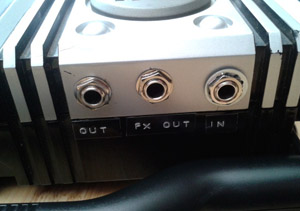I recently finished work on circuit bending another toy: a "Mix Me DJ," something I'd not actually heard of until recently but apparently they were marketed to kids by a Chinese toy company in the early 00s. I'm not going to go into much detail here on how I bent this one; I think it's much better explained on other websites if you Google it. But I will do a quick overview on the mods I made:

Most of the mods I made involved altering the clock speed of the main circuit board - which is controlled by a single resistor - or altering the signal coming out of it. However (I'm told) it's also possible to unlock hidden Easter Egg sounds which the manufacturer for some reason chose to include.
 |
 |
| The Mix Me DJ comes with a 3.5mm line-in jack but no output to external devices, so I put some extra 1/4" jacks on the back of it so I can connect it to the rest of my gear. | Be careful with tools kids; I sliced my finger with a knife and had to go to A&E. (Hooray! My first circuit bending scar!) |
The upshot of all this is that I've basically made a sort of harsh noise groovebox. While it's not possible to customise the pre-programmed drum patterns, just about everything else this gadget does can be distorted beyond all recognition and it really lends itself to putting on improvised noise shows. Here's a video of me putting it through its paces for the first time (note I also used my circuit bent Speak & Spell just so I had something extra to put through the Line In port).
Update - March 2016
Disaster has struck! I tried to install an extra circuit board inside the Mix Me DJ to give it some (limited) sampling abilities. But I somehow managed to fry the circuit board in the process and it's completely stopped working.
I've now purchased another Mix Me DJ and had to painstakingly re-create all my old circuit bends on the new board. Interestingly, when I opened up the case I found the replacement has a design improvement over the presumably earlier model I owned; it has two processors, one of which controls the rhythm and sample playback, the other controlling the sounds from the built-in keyboard. This makes for somewhat smoother sound quality and it also opened up interesting circuit bending possibilites, as the two processors can be pitch-controlled independently!

The Mark II in all its glory - March 2016
The Mark II has the following improvements over its predecessor (aside from not being broken):
- Independent coarse/fine pitch controls for different sound functions
- An in-built mini-mixer allowing it to be used as a hub for other instrument sounds
- In-built sampler, can record and play a loop of up to 10 seconds
- Generally wired and constructed a lot better as I learned from my earlier blunders